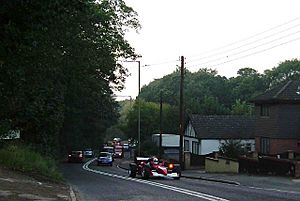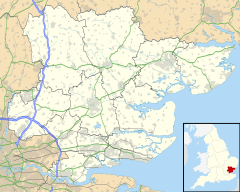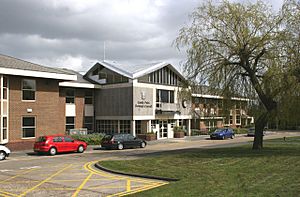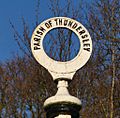Thundersley facts for kids
Quick facts for kids Thundersley |
|
|---|---|
 Bread and Cheese Hill is the name of one of the roads climbing the main slope up to the heart of Thundersley. |
|
| Population | 24,800 (2021) |
| OS grid reference | TQ800887 |
| District |
|
| Shire county | |
| Region | |
| Country | England |
| Sovereign state | United Kingdom |
| Post town | BENFLEET |
| Postcode district | SS7 |
| Dialling code | 01268 & 01702 |
| Police | Essex |
| Fire | Essex |
| Ambulance | East of England |
| EU Parliament | East of England |
| UK Parliament |
|
Thundersley is a town in Essex, England. It's part of the Castle Point area in the southeast. The town sits on a raised area of land, about 31 miles (50 km) east of London. In 2011, about 24,800 people lived here.
Thundersley includes different parts, like Daws Heath. These areas have their own churches. The town is divided into local government areas called wards, such as St Peter's and Boyce.
Contents
What's in a Name?
The name Thundersley comes from an old English phrase, Þunres lēah. This means "grove or meadow belonging to the god Thunor or Thor". Thor was a god in old Norse and Anglo-Saxon beliefs.
The name Thundersley is important because it shows a link to England's ancient pre-Christian past. It was first written down in the Domesday Book in 1086 as Thunreslea.
Exploring Thundersley's Nature
Thundersley is quite hilly for Essex. The central part of the town is about 200 feet (61 meters) above sea level. It's a mix of town and countryside, with many woods and open spaces.
Some of these natural areas include:
- Thundersley Common: A special place for nature.
- Shipwrights Wood: A 12-hectare (30-acre) woodland.
- Thundersley Glen: Another green space.
- West Wood: 22.5 hectares (56 acres), managed by a local wildlife group.
- Tile Wood and Pound Wood: Owned by the Essex Wildlife Trust.
- Starvelarks Wood and Wyburns Wood: Part of the Little Haven Nature Reserve.
Jobs and Life in Thundersley
Most adults in Thundersley have jobs. A slightly higher number of people here are retired compared to the national average.
Many people in Thundersley own their homes. In 2011, a very high percentage of homes were owned by the people living in them.
A Look Back in Time
In 1848, a book called A Topographical Dictionary of England described Thundersley. It said the area was about two miles long and one and a half miles wide. It had 2100 acres, with 100 acres of common land. The village was on high ground, with nice views.
In 1951, Thundersley had a population of 6,482 people. From 1953 to 1976, Greeves motorcycles were made in a factory in Thundersley. The company started by making cars for people with disabilities and then began making motorcycles.
Schools and Learning
Thundersley has several schools for different age groups:
- Secondary Schools: The King John School, The Deanes, and The Appleton School.
- Primary Schools: Thundersley, Westwood, Kingston, Montgomerie, and Robert Drake.
- College: The main campus of SEEVIC Further Education College, which is now part of USP College.
How Thundersley is Governed
Thundersley is managed by two main local government groups:
- Castle Point Borough Council: This council is based in Thundersley itself.
- Essex County Council: This larger council is based in Chelmsford.
Thundersley used to be an old parish. In 1929, it joined with nearby Hadleigh and South Benfleet to form the Benfleet Urban District. This district was later changed in 1974, becoming part of the new Castle Point area.
Thundersley elects one person to represent it on the Essex County Council. It also has 12 councillors on the Castle Point Borough Council. The western part of Thundersley is sometimes called New Thundersley.
Getting Around Thundersley
Thundersley is surrounded by several main roads:
- The A127 road to the north.
- The A130 road to the west.
- The A13 road to the south and east.
The closest train stations are Benfleet railway station and Rayleigh railway station. A special train, the London Tilbury and Southend No. 80 locomotive, was named Thundersley after this area. You can see it at a museum in Norfolk.
Fun and Activities
- Football: The Thundersley Rovers Sports Club started in 1963. It has teams for men, boys, and girls. They play at Thundersley Common.
- Air Training Corps: Squadron 1341 of the Air Training Corps is based in Thundersley. This group helps young people learn about aviation and develop skills.
Places of Worship
Thundersley has several churches and religious centers:
- Anglican Churches: St Peter's, Thundersley; St George's, New Thundersley; and St Michael's, Daws Heath. The St Michael's church was rebuilt in 2012.
- Other Christian Churches: Thundersley Congregational Church, Thundersley Gospel Hall, Daws Heath Evangelical Church, and Thundersley Community Church.
- Spiritualist Church: Thundersley Christian Spiritualist Church opened a new building in 1998.
Famous People from Thundersley
- James Mason (1849–1905): A famous chess player, journalist, and author. He was one of the best chess players in the world in the 1880s and is buried in Thundersley.
- Fergus Hume (1859–1932): A novelist known for The Mystery of a Hansom Cab. He lived his last 30 years in Thundersley and is buried there.
- Bernard Cornwell (born 1944): A writer famous for the Sharpe novels. He grew up in Thundersley.
- Robert Drake: A rector (church leader) in Thundersley. He was executed in 1556 for not giving up his Protestant beliefs.
Images for kids
 | Georgia Louise Harris Brown |
 | Julian Abele |
 | Norma Merrick Sklarek |
 | William Sidney Pittman |







